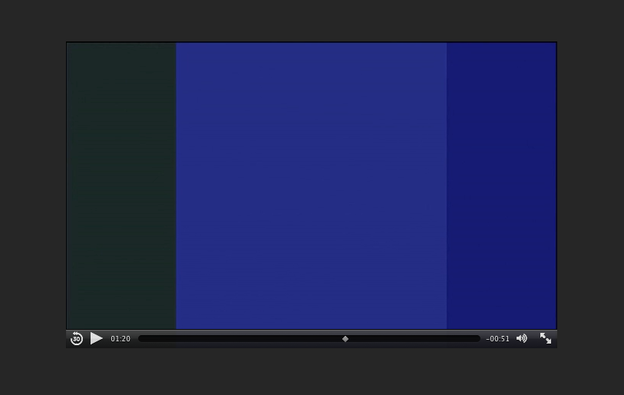
Talking doesn't always make things clearer
Christopher Willes' visible Negotiation with the invisible

Click here to view the video of Negotiation.
What happens when 'talking' happens? It doesn't always make things clearer. But what else happens? Is there another kind of exchange, another kind of dance? How are we changed by listening, by looking?
Canadian interdisciplinary artist Christopher Willes writes that in Negotiation, "Two colours are modulated by permutations of the phrase 'Talking Doesn't Always Make Things Clearer' through an augmentation of text-to-speech software (in Max/MSP). A third color (center) is created through the combination of the two."
What is being negotiated? Is this a negotiation between two people? A negotiation between two sides of some kind of conflict? Hmm. The three bands of color make the image suspiciously flag-like. Or is the negotiation more conceptual: a negotiation between words and meaning, between sign and signifier, between speaking and listening, looking and hearing, sight and sound?
Two people speaking. One on each side of the frame. They speak. There is the flash of thought. The flash of language. The exchange changes the speakers. Their colors change. The scene changes. I imagine the timing of the flashing corresponding to the sound contours of the spoken language. There are pauses where the screen remains still. The silence between sentences. The colors are clear. Without talking, it is as if after being stirred up, the sediment in some water settles and the water becomes clear again.
Gradually, the palette changes. Language is an erosion. Or is language itself changed, eroded, to reveal something else?
But am I reading this piece entirely wrong? Negotiation isn't a moving ideogram. It doesn't need me to parse its meaning. This kind of talking doesn't always make things clearer. I should just observe the dance of its change. Its flickering color shifts. Its process. We obscure with our talk and logic the apprehension of the thing itself.
Reading can be a careful observation, a close noticing. Witnessing. An attention.
Why is this is a visual poem? It is about the process of language, of signification, of visual correlates to verbal communication. Language has been abstracted to its processes. Strip away the words and structures of the sentence. What's left is the physics of grammar. The fundamental forces of language. Like astrophysicists we might have to observe something that isn't there, inferring its presence by how its forces affect what is around it. A negotiation with the invisible, the inaudible, or with what has not been said.
Based in Toronto, Christopher Willes’ work explores the intersection of music, performance, and sound-art practices and often involves technology and live performers including musicians, dancers and actors. He studied at the Faculty of Music University of Toronto, and is currently a candidate for an MFA at the Milton Avery Graduate School, Bard College (NY.) His website is here.